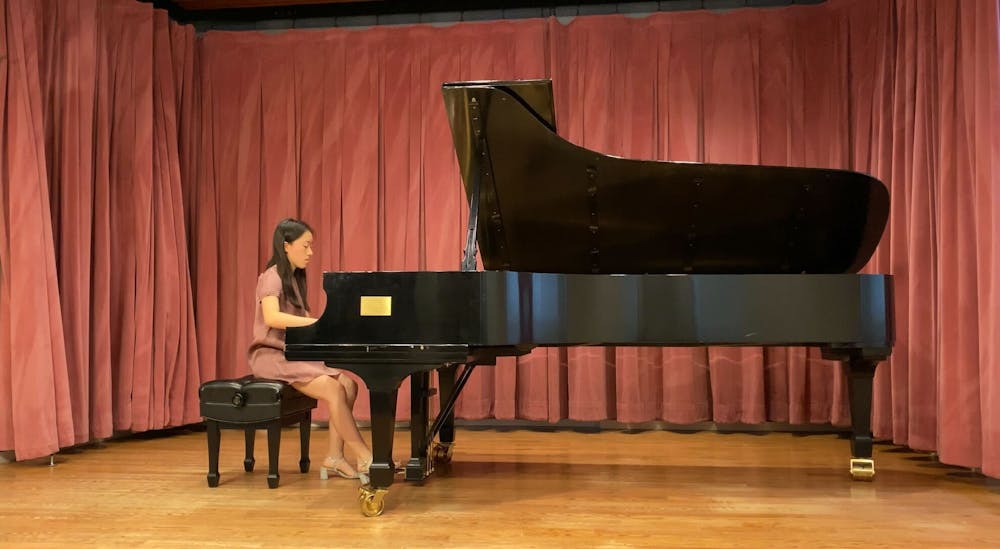
Since the moment my fingers touched the 88 black and white keys for the first time, I’ve had a love-hate relationship with the piano. While the joy that the piano brings to me always outweighs the frustration, it is those challenging moments that have made me grow as a musician and person and enabled me to love the instrument more and more.
I did not begin learning to play the piano out of personal interest or any extraordinary musical talent. Piano was simply one of the many activities that my mom signed me up for, hoping I would find one to serve as loyal company and a source of joy.
Out of all of the hobbies I tried, the piano stuck with me because its 88 black and white keys have proved, and continue to prove, their ability to fulfill my mom’s wish. Its consistent power to challenge and inspire me made me fall in love with it; practicing the piano has been a source of company, stability, growth and joy in my life.
In high school, I began to view the piano as a more serious pursuit. Encouraged by my music teachers and an upperclassman I knew through a music group, I joined a pre-college program in piano performance that was much more rigorous and intense than the private lessons I had taken up until that point. My time spent with piano increased exponentially, as did my frustration: challenges that I had never fully confronted when learning piano as a hobby started to emerge. I struggled with peer pressure, maintaining a rigorous practice schedule, resilience in learning difficult pieces and performance anxiety, all of which I overcame to some degree.
Through those challenges, I unraveled the beauty of the piano. I marveled at the complexity of fugues. Their intricate motifs reminded me of people's interactions with one another and with their different surroundings. I became familiar with the distinct alchemies created by each unique interaction. Some sound harmonious together, some travel in parallel; others collide and generate dissonance. When I was introduced to chamber music and playing in a band, I learned the importance of listening to others to adjust my own playing and recognized moments when I should increase my voice and when I should support other musicians to highlight their melody.
I was fascinated by the fact that my touch on the keys could produce the sounds I had envisioned and rehearsed in my mind. I realized that if I wanted my listeners to hear the musical ideas that I intended to convey, I had to first clearly know what my interpretation was and make myself hear that message. This encouraged me to introspect more broadly, reflecting on myself and my experiences, as I explored my identity and began to understand who I was and what I wanted.
Recognizing the loneliness of always playing in the confines of practice rooms, I also released my music from the sound-proof walls and brought them to people with whom I can share it. Through sharing my music at local churches and nursing homes, I befriended many members of my community. I received many words of gratitude for my performance, and that made me realize that the highest achievement of learning skills is to put them in service to others.
These factors motivated me to continue my pursuit of piano in college. I was excited to participate in musical opportunities at the Homewood Campus and the Peabody Institute. In high school, I was able to balance school and music easily but navigating between academic and musical commitments grew challenging in college.
The busyness of classes and extracurriculars at the beginning of sophomore year made me struggle with balancing time spent typing on my laptop for school and practicing the piano. I was very frustrated.
I tried my best to squeeze piano practice into fragmented times between classes and extracurriculars. I felt guilty and even angry when I had to sacrifice my time with the piano to check off more items on my to-do list. Even when I found the time to practice, I was unable to focus on the music that I expected myself to enjoy. As I played, my mind would drift away, and I’d worry about upcoming commitments and mentally construct to-do lists. Truthfully, I was not really listening or feeling the music. It was just my fingers moving out of muscle memory. My brain could not compartmentalize, and the coexistence of school and piano seemed like an impossible challenge to face.
Eventually, after sharing my struggle with my teacher and other pianists, I adjusted my mindset. I learned to step away from the piano when my mind started to worry about school instead of feeling the music. I learned to take breaks from school and turned to piano for relaxation. By beginning to recognize the appropriate moment to take a break, I regained the ability to compartmentalize school and music and restored their coexistence and mutualism.
Recently, sitting in front of the piano in a practice room with a large window, I played while watching the amber foliage sway in the wind. I smiled, truly happy and grateful for those moments where it’s just me and the piano. I look forward to how the piano will continue to inspire me and cherish times when the piano is beside me and the keys are at my fingertips.
Vicky Zhu is a sophomore from Shanghai, China studying neuroscience. She is a Science and Technology Editor for The News-Letter.





